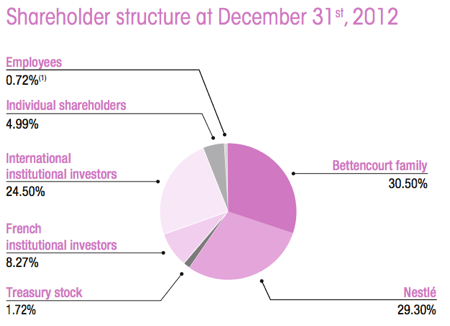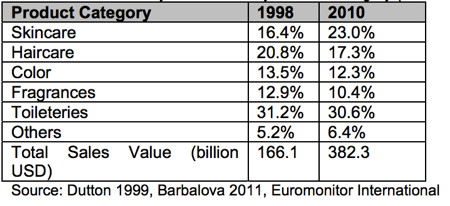L'Oreal released their results last week. Interesting business, essentially in the control of the daughter of the founder, and because we live much longer nowadays than before, she basically was there with her dad at the beginning. Liliane Bettencourt, the only child of the founder of L'Oreal, Eugene Schueller, has just celebrated her 91st birthday. According to her Wikipedia entry she started working for her dad when she was 15. The business only went public in 1963 after her father had died (1957) and had passed on the family fortune. So how long did she work for? Well, effectively until the day before Valentines day last year, that is when she officially resigned as a director of the business. 74 years long at the business founded as Aureale (a hair dye product) and then in 1919 he (Eugene Schueller) registered Société Française de Teintures Inoffensives pour Cheveux (Safe Hair Dye Company of France). Phew, L'Oreal does roll off the tongue a little easier than that longer name.
Like most companies, there is a fair amount of controversy surrounding the founder, Eugene Schueller. He provided funding for a fascist French movement that then collaborated with the Nazis during World War Two in Vichy France. Anti communist he was too, that sounds more like an entrepreneur. Ironically Schueller's granddaughter (Bettencourt's only daughter, Françoise Bettencourt Meyers) married Jean-Pierre Meyers, who's grandfather, a rabbi by the name of Robert Meyers was murdered at Auschwitz by the Nazis. Astonishing history.
Now if you think the family you live in is pulling in different directions, the granddaughter, Françoise has sued François-Marie Banier in 2008 (whilst her mom was still a board member) for taking money from here mum and wanted to declare her mum mentally unstable. Wow. She is currently under the care of her family. The son in law, Jean-Pierre Meyers is the vice chairman and if you wondered who was next in line (and naturally from the family's point of view the best person for the job), the founders great grandson, Jean-Victor Meyers is also on the board!!! But, fear not, they are not operational, rather non executive members of the board to keep an eye on the family wealth. Three of them? Well, yes. Nestle have the same number of board members, more on that in a second.
Why does the family matter at all? Because Liliane Bettencourt (the family) are the major shareholder here, as per this graphic from their annual report last year.

And Nestle? Well, for now the agreement between the two exists whereby they vote and agree together. And as such control the company. So how did Nestle get that big stake? And how did L'Oreal get a 9 odd percent stake in Sanofi-Aventis? A very valuable stake at that, around
9 billion Euros, around 12 and a half billion Dollars. Nestle and Bettencourt signed an agreement nearly 40 years ago in which they gave each other the option to buy their respective stakes as at a date, and that date is 29 April 2014. Nestle cannot increase their stake in L'Oreal for six months after Bettencourt dies, I am guessing that when the document was signed all those years ago that everyone thought they would not be around to see this. But from 29 April 2014, Nestle is able to sell this stake to whomever they want.
And if the signals from Nestle are anything to go by, they are
sellers of their stake and not buyers of the Bettencourt stake. And L'Oreal the company have signalled that they would use internal reserves to buy this back, including the Sanofi-Aventis sale. The Sanofi stake according to the CEO, Jean-Paul Agon is "financial" and not strategic. So therefore it is for sale. Plus the company has around 1.6 billion Euros of cash. But they would definitely have to borrow a whole lot in order to do this. Perhaps Nestle could unbundle the stake to their shareholders? Likely? No, they would prefer to use the funds I am guessing for other projects.
Nestle got their stake in L'Oreal when Bettencourt was worried that the socialist French government would nationalise her business and as such swapped half of the families fortune for a Nestle stake. Wow. so there is the history of THAT. And why this is important to minority shareholders is that there is a big event coming next year, in order for the company to
buy the Nestle stake, at last evenings price they would have to pay at least 22.26 billion Euros. A lot of money. So stay tuned for this very important event.
What the company has on their side are some powerful brands, Lancôme, Vichy, Garnier and The Body Shop augment their L'Oreal brand beautifully. I just had to throw that part in. The CEO reckons that they could double their potential customer base in the next half a decade. Cosmetics are soft luxuries, not as expensive as jewellery but just as necessary for emerging middle income people to announce that they have arrived. The cosmetics business is a very fast growing in emerging markets, and according to this paper,
GLOBAL BEAUTY INDUSTRY TRENDS IN THE 21st CENTURY:
In 2011 all those countries generated 81% of the global cosmetics sales growth, according to Euromonitor International's data, more than half of which (54%) was attributed to BRIC. Further emerging markets, among others Mexico, Argentina, Indonesia, Thailand and Turkey, have shown incremental growth of about 8 billion dollars
Inside of the beauty products global sales have grown strongly in the skincare category. A little table snapshot from the same paper shows you how the trends have changed pretty quickly over the last 15 years:

It makes sense that rapid industrialisation leads to wealthier middle income families that have disposable income in order to fund their lifestyle choices, beauty products included. Skincare will continue to grow faster than the other segments, meshing together science and smart marketing. In China for instance, according to research paper above:
it is believed that a pale and youthful-looking skin determines the social and economic position of a person. Richer people look younger because they spend more time out of the sun, and less time doing physical labour!!!
Results, well they were a little disappointing, well at least the
market was disappointed. The US specifically from a sales point of view fell short of expectations, inventories were wound down by some of their distributors as well as a slowdown in the market. Japan was strong, South Korea was NOT, China, India and South East Asia continued to make major progress, the area as a whole posted an 8 percent increase in like-for-like sales. Latin America, Eastern Europe and Africa/Middle East all grew at stronger rates than that. Western Europe, which is still their core market, 5.68 billion Euros of the 16.099 billion Euros in cosmetics sales (for the 9 months to end September), grew at an encouraging 2 percent for the year. Not great, but still going forward. We continue to accumulate what is a fast growing segment of the consumer market in developing markets, and continues to be a robust and fairly recession proof business in what are recovering developed markets. Buy.

